The Institute for Policy Integrity produces a variety of publications. Our research reports develop in-depth research on our core issues, while our policy briefs and issue briefs provide focused analysis on more timely or particular topics. Our academic articles and working papers offer original scholarly research and analysis from established experts as well as fresh new voices.
Latest Publications
-
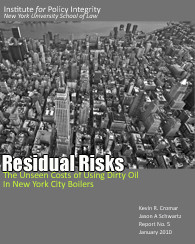
Residual Risks
The Unseen Costs of Using Dirty Oil in New York City Boilers
In about 9,000 big apartment and commercial buildings in Manhattan, Brooklyn, Queens, and the Bronx, boilers burn a dirty fuel to heat their units. “Residual Risks” analyses the health, environmental, and economic benefits of switching away from this dirty fuel to cleaner alternatives like natural gas.
-
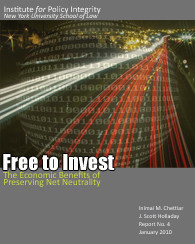
Free To Invest
The Economic Benefits of Preserving Net Neutrality
It is hard to imagine a future where the value of the Web takes a downward spiral: where less content is created, online access is less useful, and fewer people log on. In Free to Invest, the Institute for Policy Integrity warns of negative economic consequences if net neutrality is weakened. The report arrived at five main findings that describe the trade-offs of revoking net neutrality.
-
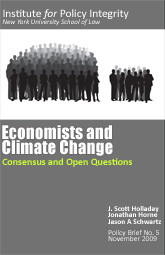
Economists and Climate Change
Consensus and Open Questions
Economists and Climate Change: Consensus and Open Questions describes and analyzes the results of a survey sent to 289 economic experts on climate change. Over 84% of the respondents to the poll said that the effects of global warming will create significant risks to important sectors of the United States and global economies.
-
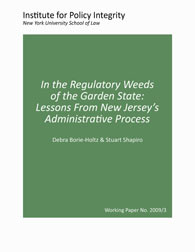
In the Regulatory Weeds of the Garden State
Lessons From New Jersey’s Administrative Process
There is a dearth of studies about the effects of the proceduralization of the rulemaking process on state regulations. In the Regulatory Weeds of the Garden State focuses on regulations promulgated in New Jersey, both prior to and following major procedural changes enacted in the state in 2001.
-
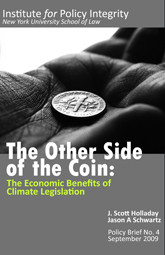
The Other Side of the Coin
The Economic Benefits of Climate Legislation
This brief compiles estimates from several different federal agencies, and calculates that the economic benefits of the emissions cap in the Waxman-Markey bill likely dwarf the costs by as much as 9-to-1 or more. The benefit to cost ratio was determined using the EPA’s previously released (and peer reviewed) cost estimates and a newly released “social cost of carbon” estimate from an interagency process which provides a conservative dollar figure for the benefits of greenhouse gas reductions.
